 |
|
Must-Read Article
|

The study was designed, implemented, and analyzed by a local community-advisory board, many of whom are also co-authors on the paper. Participants had a range of experiences with pregnancy intention screening, depending on their medical histories, attitudes, norms and perceived benefits of screening. Three themes emerged around personal agency, judgment and shame, and expertise versus authority. Table 2 in the paper provides a list of specific strategies offered by women for improving pregnancy intention screening and counseling.
Hats off to Garbers, Falletta, Srinivasulu, Almonte, Baum, Bermudez, Coriano, Iglehart, Morta, Rodriguez, Taveras, Tobier and Grosso for bringing this work to our field. With a focus on screening and our desire to be woman-centered, we encourage all partners to read this work. Click here for the full article.
Stay current! Sign up for bi-weekly emails that include abstracts of publications from around the world on women's health and well-being. Email Cheryl Robbins at
ggf9@cdc.gov
.
|
|
Freshly Picked for Our Partners
Preconception Health: Changing the Paradigm on Well-woman Health, was recently published in
Obstetrics and Gynecology Clinics by Dr. Diana Ramos: An investment in assuring the health of women, before pregnancy, can reap improved health for women, children, and their families. A paradigm shift of health
must occur if perinatal outcomes are to improve, moving beyond reactive care to preventive or preconception care. Preconception health is centered on an assumption a woman is planning on becoming pregnant. But for many women, pregnancy is unplanned and medical conditions may have a negative impact on the trajectory of pregnancy and health. A new paradigm focusing on prevention and wellness can prepare women for lifelong health and healthy perinatal outcomes.
More research on why men's preconception health matters: New study found that the risk of heart defects in infants was 44% higher if their fathers drank alcohol. They found that this risk was increased by 16% for mothers who consumed alcohol.
Keep reading.
|
The 4th Trimester Project at the University of North Carolina at Chapel Hill just launched
NewMomHealth, a new go-to postpartum resource for new families. Help us spread the news! To make it easier, we've created messages, images, and graphics you can post on your own channels.
See our communications toolkit here.
|
Attention PCC CoIIN Teams:
Population Health Improvement Partners has a plethora of PDSA eLearning modules and tools and templates
to learn about and apply improvement concepts to your work. Lots of options and support guides.
Take a look here.
Infant Mortality CoIIN Webinars (Abt Associates) - details coming soon for the below topics:
- Improving Messaging around Infant Mortality and Health Equity
- Maintaining Momentum and Addressing Project Fatigue
Email
Katherine Bryant if you have any questions or concerns about upcoming work or the evaluation survey submission.
|
|
|
Stay connected! Follow along and join the conversation:
|
|
ABOUT HRSA IM CoIIN PRECONCEPTION PROJECT: This project is supported by the Health Resources and Services Administration (HRSA) of the U.S. Department of Health and Human Services (HHS) under grant number UF3MC31239-Providing Support For The Collaborative Improvement and Innovation Network (CoIIN) To Reduce Infant Mortality. The grant amount totals $1,494,993. This information or content and conclusions are those of the author and should not be construed as the official position or policy of, nor should any endorsements be inferred by HRSA, HHS or the U.S. Government.
|
|
 |
|
 |
|
|
Examining the "P" and "p" in Preconception Policy
|
|

Over the past 15 years, policy has been part of the work of the National Preconception Health and Health Care Initiative. What has been achieved in women's health policy over the past decade is remarkable. In August, 2012, an estimated 47 million women gained coverage for recommended clinical preventive health services-including well-woman visits with preconception care components-without cost-sharing. The uninsured rate among women of reproductive age (15-49 years) dropped from 20.7% to 11.6% between 2010 and 2017, primarily as a result of the Affordable Care Act (ACA) Medicaid expansions and subsidized Marketplace plans. Still more needs to be done and leaders in women's health and MCH have a key role to play in implementation efforts through both macro-level legislative policy action and other administrative and finance action.
The "large P" Policy opportunities include expansion of Medicaid eligibility for low income adults and/or for women postpartum, as well as maintaining budgets and capacity at public clinics for family planning and other reproductive health services. "Small p" policy opportunities require no new authority or eligibility and include: improving care delivery (e.g., postpartum screening in well-baby visits), structuring interconception care to address risks, applying quality improvement to drive practice change, and using measurement to monitor performance.
|
|
The Case for Women's Health
|
 As momentum is finally gathering to address the factors that are causing high rates of maternal sickness and death, people are looking for road maps toward change. The February 2019 Technical Report from the 2018 HRSA Maternal Mortality Summit offers a series of key findings and actions that deserve consideration. The report calls for improved access to patient-centered, comprehensive care for women before, during, and after pregnancy, especially in rural and under-served areas. It calls continuity of care before, during, and after pregnancy by increasing access to and utilization of a variety of types of health care providers. The report also calls for continuous team-based support and use of a life course model of care for women before, during, and after pregnancies. As momentum is finally gathering to address the factors that are causing high rates of maternal sickness and death, people are looking for road maps toward change. The February 2019 Technical Report from the 2018 HRSA Maternal Mortality Summit offers a series of key findings and actions that deserve consideration. The report calls for improved access to patient-centered, comprehensive care for women before, during, and after pregnancy, especially in rural and under-served areas. It calls continuity of care before, during, and after pregnancy by increasing access to and utilization of a variety of types of health care providers. The report also calls for continuous team-based support and use of a life course model of care for women before, during, and after pregnancies.
These findings underscore the importance of our collective work as well as the work underway in California, Delaware, North Carolina, and Oklahoma through the Preconception CoIIN Project. As our website, BeforeandBeyond.org has long promoted, our efforts aim to change the way women experience care and receive services. Thank you for your ongoing support for this work and work as change agents!
Click
here
to read the full report.
|
|
A Global View of Preconception
|
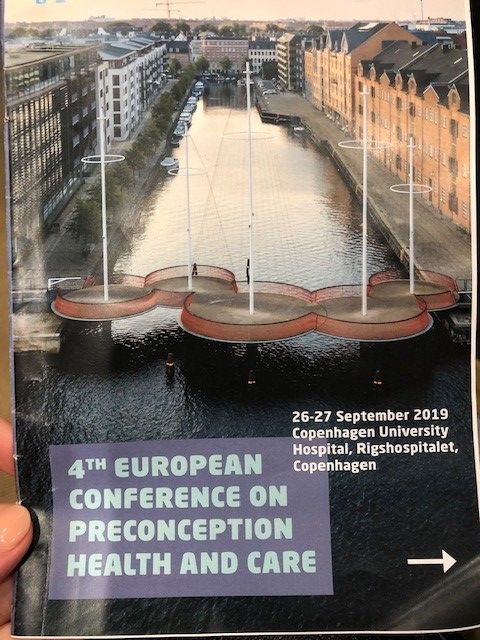 The 4
th
European Congress on Preconception Health and Care was held at the Copenhagen University Hospital in Denmark, September 26-27, 2019. The meeting brought together almost 200 people from across Europe as well as from Australia, Japan, Moldova, China, Canada and the US. The forum for the event was shaped by the hosts who largely focused the program this year on issues relating to fertility, men's reproductive health, ethics, and the larger determinants of health and well-being. The 4
th
European Congress on Preconception Health and Care was held at the Copenhagen University Hospital in Denmark, September 26-27, 2019. The meeting brought together almost 200 people from across Europe as well as from Australia, Japan, Moldova, China, Canada and the US. The forum for the event was shaped by the hosts who largely focused the program this year on issues relating to fertility, men's reproductive health, ethics, and the larger determinants of health and well-being.
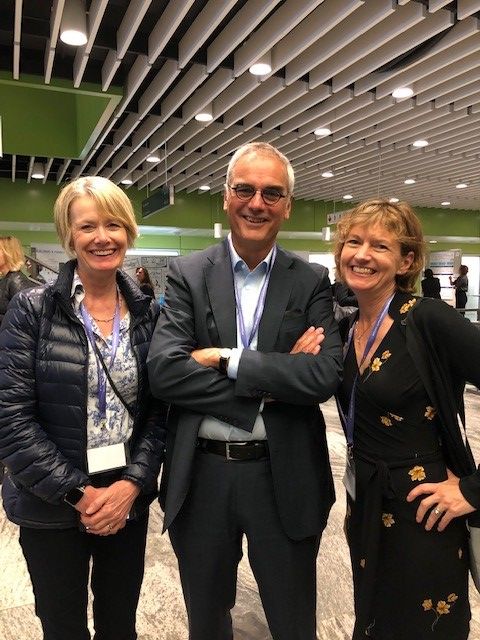
A key challenge for providers in Europe is addressing issues around delayed childbearing and resulting decreased fertility. As one speaker noted that "biology has not kept up with feminism." Lack of knowledge about fertility and reproduction in general are two issues as is an overly positive perception of the efficacy of treatment for fertility problems. Another challenge is that women report that they aren't able to find a partner who is ready to become a parent. The presentations, strategies shared, and question/answer sessions fostered interesting and robust conversations.
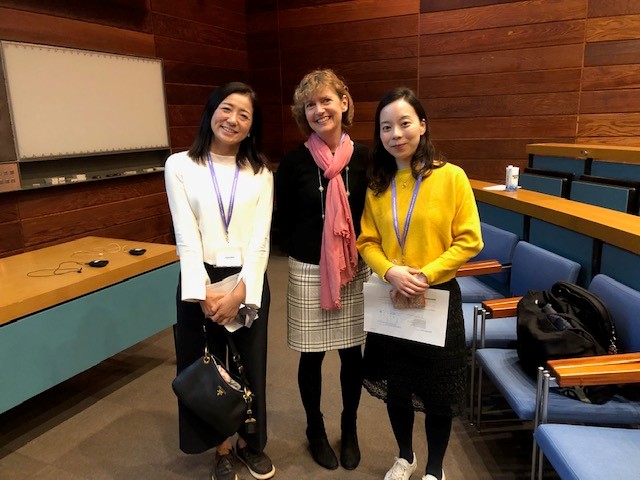 Research about the influence of men's health and sperm quality on conception and healthy births was discussed widely. With growing evidence that poor nutrition, substance use, age, chronic disease, and environmental exposures impact sperm quality, the necessity of expanding preconception health messages to all genders is clear. Where the responsibility for providing this care and these messages falls was an interesting conversation topic. Research about the influence of men's health and sperm quality on conception and healthy births was discussed widely. With growing evidence that poor nutrition, substance use, age, chronic disease, and environmental exposures impact sperm quality, the necessity of expanding preconception health messages to all genders is clear. Where the responsibility for providing this care and these messages falls was an interesting conversation topic.
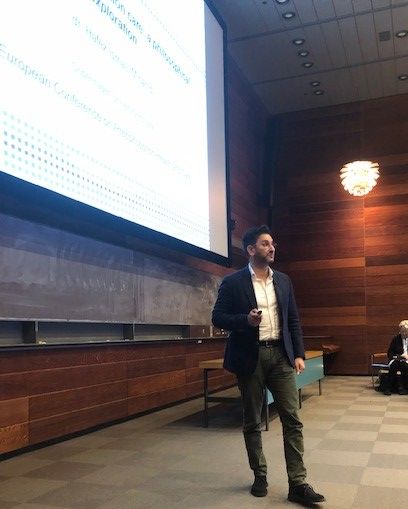 Dr. Hafez Ismaili M'hamdi and Sharissa Smith, b
oth from the Netherlands, offered thought provoking lectures around the ethics of preconception health and health messaging. Dr. M'hamdi focused on health justice, interrogated the concept of supply and demand in preconception health, and underscored the importance both taking "women out of poverty, and poverty out of women." He quoted a new book on health inequalities in Europe by Mackenback (2019) that found that
"Health inequalities have not only persisted while welfare states were being built up, but on some measures, have even widened, and are not smaller in European countries with more generous welfare arrangements." Sharissa Smith's doctoral presentation on preconception health messaging was one of the prize winners for the Congress. The UNC team will be reaching out to both speakers to continue this important conversation. Dr. Hafez Ismaili M'hamdi and Sharissa Smith, b
oth from the Netherlands, offered thought provoking lectures around the ethics of preconception health and health messaging. Dr. M'hamdi focused on health justice, interrogated the concept of supply and demand in preconception health, and underscored the importance both taking "women out of poverty, and poverty out of women." He quoted a new book on health inequalities in Europe by Mackenback (2019) that found that
"Health inequalities have not only persisted while welfare states were being built up, but on some measures, have even widened, and are not smaller in European countries with more generous welfare arrangements." Sharissa Smith's doctoral presentation on preconception health messaging was one of the prize winners for the Congress. The UNC team will be reaching out to both speakers to continue this important conversation.
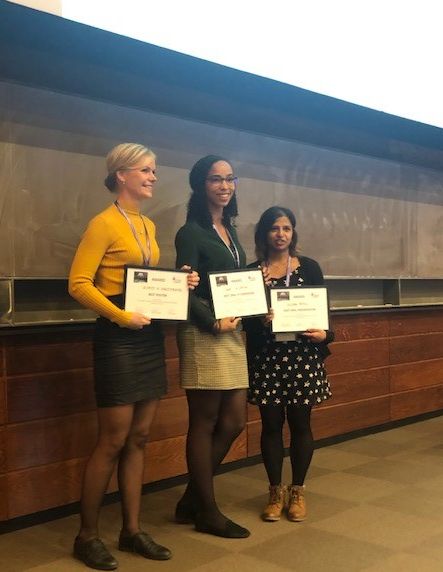 Presentations on the impact of environmental exposures and climate change on fertility identified yet another worrisome link for young people coming of age during this time. The connection between the climate and healthy reproductive is clear and should be a clarion call for the field to link arms with those working for environmental justice. Authors of the recent Lancet series on preconception health also presented messages about the importance of providing supports to individuals while also focusing on policies and resources to promote larger community well-being. Presentations on the impact of environmental exposures and climate change on fertility identified yet another worrisome link for young people coming of age during this time. The connection between the climate and healthy reproductive is clear and should be a clarion call for the field to link arms with those working for environmental justice. Authors of the recent Lancet series on preconception health also presented messages about the importance of providing supports to individuals while also focusing on policies and resources to promote larger community well-being.
Overall, it was heartening to learn that people in other countries face challenges similar to ours in the US and exciting to see all the research, programs and energy in this space. As a bonus, it was encouraging to know that the time we continue to invest in ShowYourLoveToday and BeforeandBeyond matters to people around the world.
Many thanks to the Danish organizing committee who did a wonderful job. Mark your calendars for London 2021!
|
|
|
 |